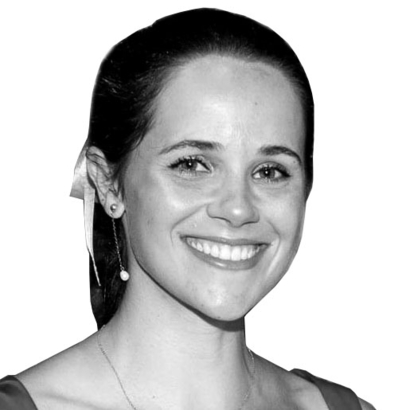In the depths of East Williamsburg, past Pumps Exotic Dancing and one of America’s dirtiest estuaries, a neon-yellow glow marks the entrance to a concrete warehouse.
Inside, Gen Z girls in low-rise denim film TikToks while techno gays breeze by in black mesh. Past a jungle of palm fronds and banana leaves, an Adonis in a white tux offers prosecco for the freight-elevator ride up, where a second sentry smiles in a cloud of Jolly Rancher–smelling vape smoke. If her iPad permits, she guides puzzled pilgrims to a Moroccan-rugged mecca where towers of halvah loom and pretty people smoke hookahs to a mix of Bedouin beats and Drake. Welcome to Habibi, a Levantine oasis above the North Brooklyn Industrial Business Zone.

Habibi has been brought to New York by the folks behind Grand Cayman’s Palm Heights. It began there amid an island-wide lockdown at the start of the coronavirus pandemic. Wanting to celebrate her sequestered team, Gabriella Khalil, the luxury hotel’s creative director, came up with a Middle Eastern night at the beach. An Italian-American raised in Philadelphia, Khalil turned to her Egyptian mother-in-law’s recipes to bring kofta and kebab to the Caribbean.
Three years and hundreds of tropical plants later, Habibi popped up at Scott Avenue Associates, a new private “community” at 154 Scott Avenue that will soon contain a swimming pool, an “immersive participatory ice-skating rink,” and a Swiss fondue restaurant. It’s situated in a 111,000-square-foot industrial property near the nightclubs Elsewhere, House of Yes, and the Brooklyn Mirage. “Obviously, Bushwick is a really inspiring place,” Khalil, 41, says of the restaurant’s location.
Never mind that Habibi isn’t technically in Bushwick, or that some, like my elevator operator, still consider this Brooklyn-Queens threshold a “bad neighborhood.” Indeed, pothole-pocked Scott Avenue, on which the warehouse sits, runs right by Newtown Creek, the Superfund site where this summer police found the bodies of two young men who had disappeared from the Mirage.
But the grime and crime surrounding Habibi ostensibly make it cool, like the underground site of Tom Wambsgans’s stag party in Succession. Located between a recycling plant and a bus depot, and filled with bow-tied servers ready to slice tomatoes tableside and swaddle guests in pashminas, it’s derelict and decadent. Both aspects appeal to Abdul Rahman, 29, an entrepreneur raised in Damascus. “Getting to say, ‘I was there early,’ that’s part of the selling point,” he says.

But not everyone is sold. Comments on one viral Instagram reel include “I could just taste the asbestos as I walk through the warehouse” and “It’s giving Dexter vibes,” a reference to the Showtime series about a forensic technician leading a double life as a serial killer.
Nick Vogelson, editor in chief of Document Journal, a fashion magazine, says he was drawn to Habibi’s air of mystery. In June, he received a cryptic email from a P.R. rep, inviting him to the vaguely worded launch of a “Levantine experience” happening near Basement, a techno club he frequents. Emerging from the freight elevator, Vogelson felt like he’d stepped into a scene from a David Lynch film, where the eclectic staff seemed “in on something” he couldn’t quite pin down.
Habibi’s unabashed Arab-ness is another draw; its leather-bound menu is printed in English and Arabic. Tara Salloum, a creative director of Lebanese descent, appreciates how Habibi wasn’t “whitewashed as Mediterranean” when she went for dinner in August. While for Nina Tiari, an Iranian-American fashion designer and Palm Heights regular, Habibi is “a place where the beauty of Middle Eastern culture is celebrated,” not vilified.
“I could just taste the asbestos.”
Meanwhile, Rahman, who is Palestinian, has found in Habibi an Arab alternative to Port Sa’id, the Manhattan outpost of Tel Aviv’s hippest restaurant. “In Astoria and Bay Ridge, you have great authentic food, but you don’t go there to go out,” he explains, noting the taboos on open queerness and alcohol consumption in such spaces. At Habibi, Rahman says, he can expose his non-Arab friends to his culture, from arak to performances by neo-soul artist Felukah, Cairo’s answer to SZA.

Back in the summer, the scattered service and ubiquitous caution tape created a chaotic atmosphere that prompted comparisons to Fyre Festival: the restroom had Hermès soap, two toilets, and no stalls. But since then, things have steadied: stalls have been added. Rahman says those that complain about Habibi’s scrappiness are missing its “charm” and “flair”—qualities he finds lacking at the shiny “dystopias” of Casa Cipriani and Zero Bond. When I went to Habibi, the crowd was young, queer, and colorful—nary a gray hair or Patagonia vest in sight. Notable guests, according to Instagram, have included niche performance artists, Dimes Square creative directors, and freelance fashion writers.
Habibi is backed by the Cayman Islands–based billionaire Kenneth Dart, who is said to own more of the Caymans than the Cayman government. His many investments on the islands have transformed them from a tax haven into a bona fide vacation destination. Dart has recently been on a property-buying spree in New York, and during Fashion Week another Palm Heights spin-off, Tillie’s, opened at Water Street Associates, “a new downtownhub.” Although Habibi is set to close at the end of December, the Cayman Islands’ influence in the city seems only set to grow.
Carrie Monahan is a Brooklyn-based journalist


